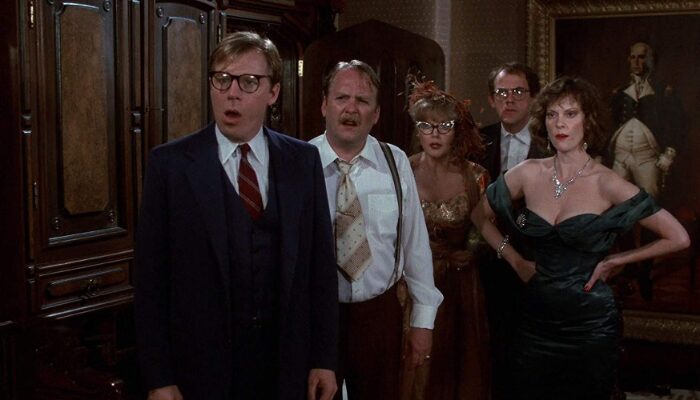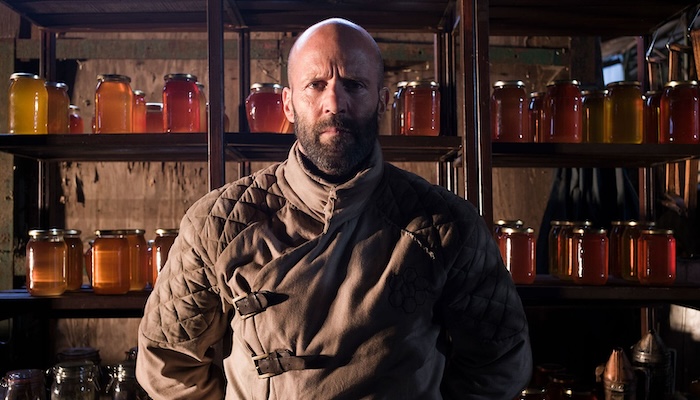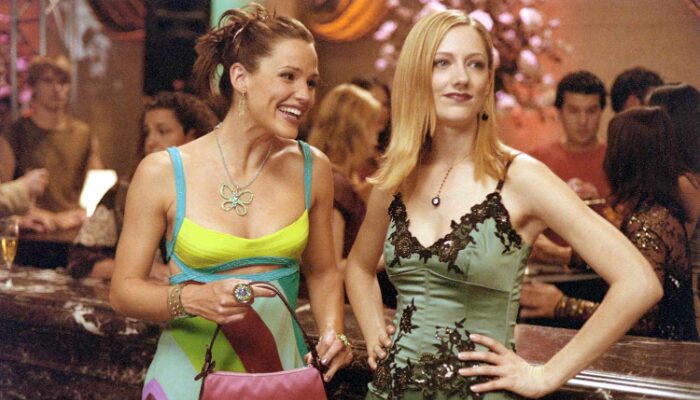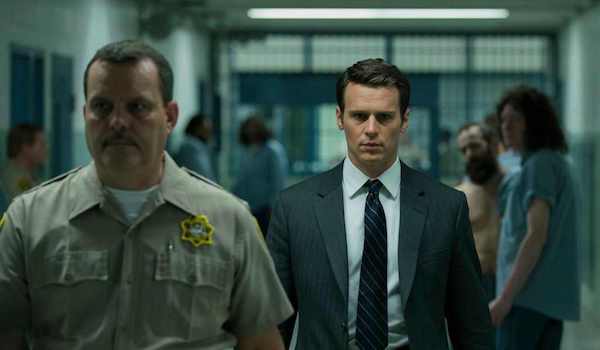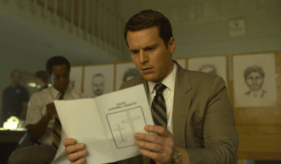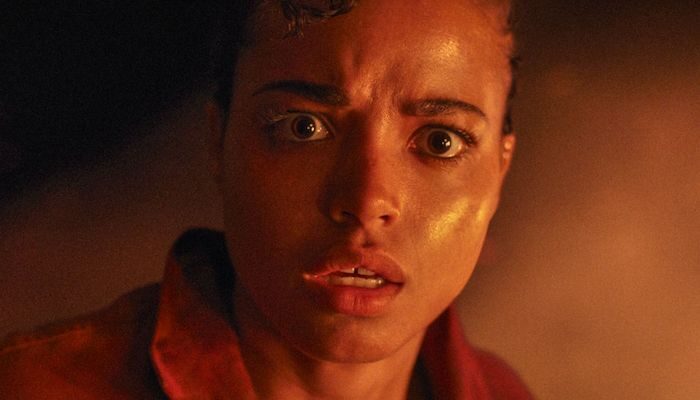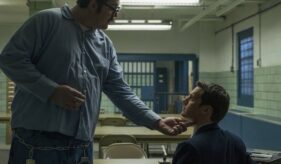TV Review: MINDHUNTER: Season 1, Episodes 1-10 [Netflix]
Mindhunter Season 1 Review
Netflix‘s Mindhunter: Season 1: Episodes 1-10 was the best crime TV season released on television since the first season of True Detective and the first three seasons of The Killing. Mindhunter was released into a law enforcement, procedural TV landscape but only a small portion of it was a law enforcement procedural. The criminals in Mindhunter, for the most part, had already been apprehended, sentenced, and some had already been incarcerated for years.
Instead of trying to get into the heads of criminals to get them to confess, the FBI special agents in Mindhunter spent the majority of their time trying to draw out the inner workings of the criminals’ minds. Doing so had a myriad of side-effects, some good, some bad, and some almost insidiously undetectable.
Friedrich Nietzsche said in Beyond Good and Evil that “he who fights with monsters should look to it that he himself does not become a monster. And if you gaze long into an abyss, the abyss also gazes into you.”
That quote summed up what slowly happened to FBI Behavioral Science Unit Special Agent Holden Ford (Jonathan Groff) during the first season of Mindhunter. Two people observed this change in FBI Special Agent Ford during the season: Agent Ford – who was honest about himself in the last episode of the season i.e. looking into the abyss and seeing his reflection and Deborah ‘Debbie’ Mitford (Hannah Gross), an observational character that met Ford at the beginning of his journey and noted how the “sweetness” and “curiosity” in him had vanished by the end of Season One. From its outset, Ford and Debbie’s relationship wasn’t an easy one, which is one of the reasons why it was so enjoyable to watch.
Like Ford said in the second episode, Debbie made courting her arduous, testing Ford’s mental and verbal dexterity every step of the way.
In a way, FBI Special Agent Holden Ford’s relationship with Deborah Mitford was his safe harbor, a place where he could decompress from the FBI Behavioral Science Unit and the interviews and speak to someone that understood him and his work. That safe harbor dissipated during the course of the season, eroded as: 1.) Ford and Debbie’s relationship became more and more one-sided, 2.) Ford needed that safe harbor less and less (his personality change), and 3.) Ford’s perceptive nose became more acute.
That nose sniffed out Debbie’s infidelity long before Debbie realized what a good detective and observer Ford had become. Debbie feigning insult and peevishness at his insinuations were hilarious in retrospect as she didn’t believe Ford knew or could detect what was truly going on when he was not with her. This culminated in two brilliant scenes: 1.) during the black-out, psychology, grad school experiment where Holden walked in on Debbie with another man and 2.) when Holden used Debbie’s body language and basic observations to hypothesis that Debbie was going to break up with him. The former scene was entertaining but the latter scene was an impressive use of Ford’s acquired skill set. Debbie hadn’t even realized how many signals and clues she had given off until Ford enumerated them.
The same could not be said about the killers in the first season of Mindhunters, especially Edmund Kemper (Cameron Britton). The killers were not open books waiting to be read. Their stories, the pages of those books, had to be pried open, little by little. Once Special Agent Ford found the proper, distorted key to each warped lock, the killers’ valuable mental information flowed out.
All of the killers in Season One of Mindhunters had diverse personalities, which made their individual sections in the season unique. The viewer never knew what they were going to get with each killer until that killer began emoting, either verbally or through body language: Edmund Kemper captivated through his stature, gravitas, and genuine politeness, Jerry Brudos (Happy Anderson) was a liar whose fetish was unique, Richard Speck (Jack Erdie) was walking, talking bravado, enraptured with the machismo everyone ascribed to him, Monte Ralph Rissell (Sam Strike) may have had a shred of goodness left in him i.e. the girl he let go, and Darrell Gene Devier (Adam Zastrow) was an overconfident neophyte that talked himself into a prison sentence.
Of all the killers, Edmund Kemper made the biggest impression and was given the most screen time. He book-ended the first season of Mindhunters. Kemper met both versions of FBI Behavioral Science Unit Special Agent Holden Ford: the idealist looking to gleam new knowledge about those he chased and the successful, arrogant trailblazer who was not going to let morals get in his way.
Kemper’s ear-to-ear throat slit moment with Ford was so chilling that Kemper had to put a hand on Holden’s shoulder to reassure him. That moment, early in the season, paled in comparison to Kemper and Holden’s final meeting in Mindhunter during Episode Ten. Both episodes were directed by David Fincher but it was the last episode where the viewer knew exactly what Kemper was capable of and the brain power he possessed. Ford had been a fool. He let his guard down with a serial killer (something his partner, FBI Behavioral Science Unit Special Agent Bill Tench (Holt McCallany), warned him against) and took the situation at face value.
One of the most precision-rendered shots in the First Season of Mindhunter was when Edmund Kemper jumped off the hospital bed and stood between Special Agent Ford and the sole door out of the room. Ford, who had been chronicling the world of serial killers, found himself potentially in the slaughterhouse of one of them. The best part of that moment: Ford and Kemper knew it.
Kemper used fear as his ‘knife’ against Ford, a person he wanted to be friends with. Kemper ‘stabbed’ Ford with that knife and twisted it once plunged, dialing up the fear in his would-be buddy. This occurred until Special Agent Ford, and the viewer, believed Ford would be Edmund Kemper’s next victim and there was nothing that Ford could do about it.
What really happened at the climax of that scene was shocking. The moment had been so high tension, perilous, and disturbing, that in the closing moments of the episode and the season, it seemed as though Agent Ford might have literally been frightened to death (or at least was in the throes of a severe panic attack). If FBI Special Agent Ford died (it’s doubtless that he would since Mindhunter was renewed sixth months before it premiered and Groff’s character had undergone the most character development), would Edmund Kemper be blamed for it?
Leave your thoughts on this Mindhunter: Season 1: Episodes 1-10 review and this season of Mindhunter below in the comments section. Readers seeking more TV show reviews can visit our TV Show Review Page, our TV Show Review Twitter Page, our TV Show Review Facebook Page, and our TV Show Review Google+ Page. Want up-to-the-minute notification? FilmBook staff members publish articles by Email, Twitter, Tumblr, Google+, and Facebook.
Related Articles
FilmBook's Newsletter
Subscribe to FilmBook’s Daily Newsletter for the latest news!



